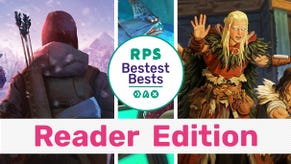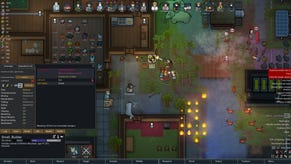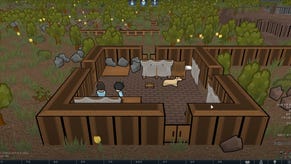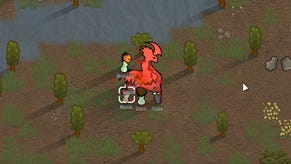Early Impressions: Rimworld
Angry squirrels on the final frontier
The last few times we looked at top-down sci-fi survival-strategy (is that a thing? Genres are becoming so tricky lately) Rimworld it was merely flirting with the idea of being genuinely playable, but recent buzz had it that the Rimworld was now inhabitable at last. It doesn't take much to convince me to starve to death on an alien world, so I thought I'd check in.
I'm pleased to report that, despite still being in alpha Rimworld is now very much weaving the spell it needs to. It’s made up of parts borrowed from all over – Prison Architect’s look, Minecraft’s resources, Project Zomboid’s defensive mentality, Don’t Starve’s, er, starving and a whole lot of Dwarf Fortress’ poppier side – but they’ve come together very well.
Here’s the setup: you’re crashed on a randomly-generated alien world, of varying hostility depending on what starting settings you chose, and you need to build some sort of life there. You’ll need shelter, food, power and defence as a starting point, but each of those requires the right equipment and the right resources. These can found or mined, and for much of the time the pace of the game is such that you’re able to get on with this stuff – slowly building up, slowly increasing the quality of your habitat, slowly becoming self-sufficient.
Intermittently, raiders arrive, or an animal gets upset about something – honestly, you won’t believe how many times my colonists got attacked by a furious squirrel – and you’ll need to be able to defend yourself, both by giving your guys weapons and by constructing turrets. But turrets require power, power requires solar energy, the sun’s not up to much at night or in winter and, well, that’s the way Rimworld spirals out. Everything requires something else, but there’s a pleasantly organic nature to the technological upscaling and co-dependency here. It’s not a frenzy of build, build, build, but this ever-widening circle, dutifully getting on with creating stability in a treacherous place.
It could probably get away with being a pure sandbox, but the elements of chaos, driven by an impressively invisible 'AI storyteller', really bring the survival fantasy to life. Rabid squirrels are a small problem, but something like an invading tribe is more serious. You’ve got to manually toggle your colonists into combat mode, then deal with the fact they’re just not very good at shooting, then in the aftermath deal with injuries, corpses and potentially prisoners. Untreated wounds lead to death, bodies lying about the place upset people (though the emotional health aspect of the game doesn’t seem totally developed as yet), while wounded enemies could represent a threat or a potential ally.
Little decisions, potentially fatal decisions. What this kind of game needs to excel at is constantly shifting priorities, rather than just a clear ladder to steadily climb, and so far Rimworld is doing a fine job of that. One second I’m fixated on needing to find more steel, the next I’m hauling a newly one-armed colonist off to a medical med and praying her colleagues can stop the bleeding in time.
Despite the presence of an AI string-puller, I've very rarely found Rimworld to be wantonly cruel, rolling some invisible dice to decide that I’m going to suffer, because clear thinking and most all accumulated knowledge of what’s required will resolve most, if not all, problems. There’s always a cause for each effect. This is a world with clear rules, and the trial and error needed to learn them means hilarious mishaps and rewarding revelations. Build batteries outside, for instance, and they’ll short out when it rains, potentially starting a fire in your settlement. It wasn’t just a fire which started for no reason. There’s a hell of a lot to learn, and not too much help, but it all funnels out gradually and logically.
Clearly Rimworld’s a long way from finished, but now it feels like the rabbit hole it needs to be. I have all these goals in my mind, with building a spaceship and escaping right at the end of them, but I know they’re going to take a long time, I know they’re going to shift, and I know they’re going to be marred by tragedy. And accidental hilarity, too. Those damned squirrels!
There’s scope to make it deliberately hilarious too – on my first attempt at Rimworld, one of my three starting colonists was a noble who refused to do any manual labour. She just ambled about the place while the other two worked their bums off to build her a bed, cook her food and fetch rocks from a million miles away. I wasn’t too upset when the pirates took her life.
All this said, I’m not in love with how Rimworld looks. It’s very Prison Architect in the great outdoors, and I never entirely took to PA’s South Parky art style either. The interface is pretty awkward too, but when you’re talking about a game whose partial inspiration is Dwarf Fortress, maligning any GUI feels a bit rich.
Push on past these starting hurdles and Rimworld’s well worth it, though, and I'm saying that at a point where I've barely scratched its surface. Whereas some of these grand-scale management games can feel like a collection of disconnected ideas without overarching purpose, Rimworld very much seems to have its eyes on the prize. It's imbued with a sense of impetus, and it deftly creates the vignettes of hilarity and tragedy needed to make it feel like a functioning place. I like it a lot. If you're after a slow-burn survival and construction game which doesn't involve getting unexpectedly shot/bitten in the face at any given moment, here's your new home.
The Rimworld Alpha - currently at version 9e - is out now. It costs $30.





















